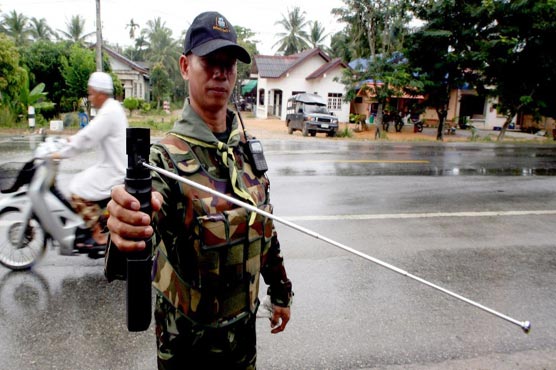Thai junta says no lessons needed from bogus bomb detector order

From 2008, Thai security forces bought around $20 million worth of the ineffectual equipment.
BANGKOK (AFP) - Thailand’s junta number two on Thursday denied the army had "lessons" to learn from its multi-million-dollar purchase of fake bomb detectors, after a businessman became the first Thai to be convicted over the scandal.
Thailand fell victim a decade ago to a scam run by British fraudsters selling the ‘GT200’ detector, a useless home-made plastic box with a radio antenna -- made for a few dollars but sold for between $3,300-$13,000 per unit.
From 2008, Thai security forces bought around $20 million worth of the ineffectual equipment.
Its soldiers in the restive Muslim-majority south detained hundreds of people after sweeps with the device, claiming they had come into contact with explosives.
Some of those arrested were held for a number of years, leading to accusations of human rights violations against the country’s Malay-Muslim population.
Thai soldiers also continued to die from undiscovered bombs laid by insurgents while the devices were in use.
Two British fraudsters were jailed in 2013 for making millions selling the GT200 and similar devices to governments including Thailand, Mexico and Iraq.
On Wednesday businessman Suthiwat Wattanakit, of Thai military tech firm AVIA Satcom, became the first Thai to be held accountable over the scandal.
He was given a nine-year sentence for fraud after hawking $275,000 worth of the devices to the army -- a small portion of the overall procurement -- between 2008 and 2009. He was bailed pending appeal.
But a day after the sentencing Prawit Wongsuwon, the junta number two who was the defence minister at the time the orders were made, batted away questions over what lessons could be drawn about army procurement.
"We did nothing wrong so what is the lesson? They (the army) didn’t commit any wrongdoing," he told reporters.
He added that tests on the devices "worked" at the time they were purchased without elaborating on how the military had reached that conclusions.
The GT200s creators falsely claimed the hand-held device was powered by the user’s static electricity rather than a battery.
It also had a substance-detecting "sensor card" inside a plastic handle, they said, which could sniff out tiny amounts of explosives or drugs from hundreds of metres away, even through walls and underground bunkers.
The claims were rubbished by scientists.
The kingdom’s defence budget has nearly tripled over the last decade, a period where the military has seized power twice.
Expensive purchases or military upgrades -- such as $1 billion set aside for Chinese submarines -- have frequently been met with public criticism for a lack of transparency.
In the 1990s Thailand’s military also bought an aircraft carrier but it soon became a notorious white elephant after its ageing Harrier jets were withdrawn from service and never replaced

